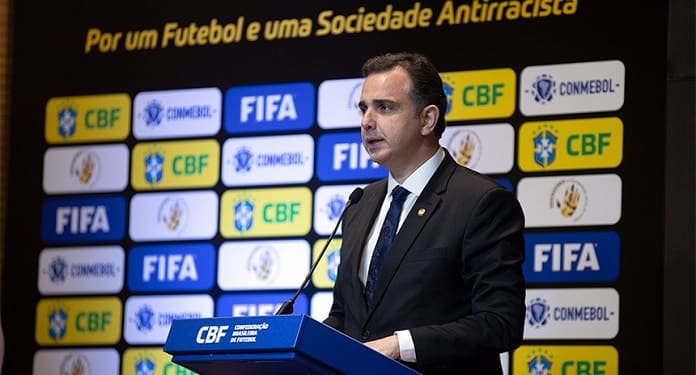The General Sports Law and the Legal Framework for Gambling should return to the Senate’s agenda after the election period, according to the president of the House, Rodrigo Pacheco, in participation in the seminar on best international practices for preventing and combating racism and any type of violence in football, held by the Brazilian Football Confederation (CBF), in Rio de Janeiro. The event took place on Wednesday, the 24th.
The Sports Law project (PL 1.153/2019), by Senator Veneziano Vital do Rêgo (MDB-PB), was approved in June in the Senate, with rapporteurship by Leila Barros (PDT-DF), and in July by the Chamber of Deputies . However, the project received some modifications and needs to go through the senators again.
According to Pacheco, although the decision on the rapporteurship of the project has not been officially disclosed, the task should be passed on to parliamentarians such as Leila herself or Romário (PL-RJ), who have experience in the area.
“This text should be on the agenda after the October elections. There has already been a wide debate about it in the Chamber of Deputies and there are also many requests for an agenda with the Senate Presidency by clubs, athletes, as well as journalists and radio broadcasters. Let’s listen to everyone, also having a broad debate in the Federal Senate”, declared Pacheco.
Project that regulates the gaming sector will be appreciated after the elections
The president of the Senate also spoke about the project that regulates the gambling segment in Brazil (PL 442/1991), approved in the Chamber in February of this year. According to Pacheco, leaders asked the Presidency of the House to evaluate the possibility of deliberating the proposal.
The senator stressed that the progress of the project in the Senate should take place after the electoral period. “It is one of the projects [on which] the leaders asked for an evaluation by the Presidency. As soon as the elections pass, we will make an assessment about the appreciation in the Senate”, he said.
Check out other excerpts from the Senate president’s speech at the CBF event:
Professionalization of sport
According to Agência Senado, Pacheco considered Law 14,193, of 2021, which established the Societies Anonymous of Football (SAFs), a milestone for the professionalization of football teams in Brazil. Coming from PL 5.516/2019, presented by Pacheco, the text gave good results in its first year in force.
“It was very positive, many groups are joining because they see the law as an inevitable path even for the survival of several clubs in Brazil. I take a positive view, but, obviously, we are also open to listening to those who participate in the day-to-day of football, to improve whatever is necessary”, he declared.
Invasions to stadiums
Invasions of clubs and attacks on football teams registered in recent months are “something intolerable that must be repressed by the police, the Public Ministry and the Judiciary”, in the opinion of the president of the Senate.
“Intolerances about football are repeated in all social areas: in the family, husband with wife, brother with brother. It is a time when we need to preach peace and respect for differences. In Congress, we need to make laws in this sense, but also promote a social mobilization of all the powers imbued in this purpose. All authorities need to set an example”, he stressed.
Racism in football
Pacheco reinforced that he insisted on attending the CBF seminar because the Senate is committed to fighting racism in sports. In addition, the parliamentarian promised to forward bills on the subject, but considered that toughening the penalties for these crimes was not enough.
“The solution to crimes of racial slur practiced in sport will come when the individual begins to receive, in addition to State repression, of a criminal and civil nature, repression from society itself. May those around that person generate an embarrassment around this conduct. It is a maximization that will be achieved over time, through education and discipline, and that needs to have a broader social commitment”.
“These are times of great intolerance in Brazil, where it is necessary to react. Through institutions, legislation, treatment and punishment of these episodes. I believe that the country will pass this phase in the best way. Political polarization and disagreements are natural in an election period. We just cannot allow extremism, radicalism, intolerance, disrespect that leads to violence. Violence that exists today between neighbors, in work relationships and we need to contain it with institutional strength”, he added.





















































